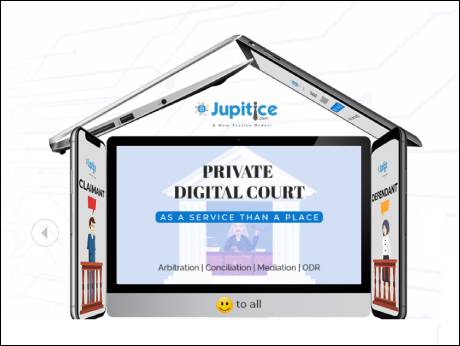
New Delhi, May 15, 2021: India-based Jupitice Justice Technologies has developed the world’s first private Digital Court under the Private Justice System (Alternative Dispute Resolution or ADR Mechanism).
The ever-increasing disputes and high case pendency has taken a toll on public justice systems worldwide. According to a study by the World Justice Project, there are approximately 5 billion people who don’t have access to basic justice needs. This is why a Private Digital Court that facilitates ADR proceedings or out-of-settlements online would not only help reduce the burden on the public justice systems, but also enhance access to justice anywhere or anytime.
Jupitice Private Digital Court is a combination of the world’s first end-to-end digital justice delivery platform that facilitates all the participants involved in the dispute to perform tasks (case filing to awards & settlement) online and on a single platform. Jupitice has also aggregated ADR professionals across the world to form its ‘Marketplace’ which makes it even easier for justice seekers to connect with justice providers.|
With Jupitice Private Digital Court in the market, it is not just easy for common people to settle their cases outside the purview of the court, but also for the MSMEs to resolve their crossborder disputes without any jurisdiction barrier. Like any other arbitration award, even an online arbitration award received on the Jupitice platform is as legally enforceable as a court decree.
Says Raman Aggarwal, Founder and CEO of Jupitice:“It is a new justice order where all parties involved are happy. Unlike a litigation process, justice through ADR mechanisms is quick, less stressful, and cost-effective and results in a mutual settlement maintaining a healthy business relation.”
In the context of the current COVID-19 scenario, the need for digital justice has been discussed more than ever. While releasing NITI Ayog’s ODR Handbook, Justice DY Chandrachud stressed on the critical role of Online Dispute Resolution and said,“The effective use of affordable ODR services can bring about a major change in the perception of parties involved in the dispute—by making the process more accessible, affordable and participative. It will make all parties consider it more amicable and solution-oriented. This will ultimately lead to more efficient dispute resolution.”
Tech note: What is Private Justice System?
Private Justice System is a privatization of Civil Justice through the ADR Mechanisms. ADR Mechanism refers to private mechanisms of resolving disputes outside of the Court processes allowing parties to tailor make their process in order to incorporate the needs of both parties. In other words, Private Justice System offers Private Dispute Resolution Services. ADR Mechanisms stands for Alternate Dispute Resolution, which is alternative to litigation, i.e. Public Justice System – State-based adjudication. Civil Justice System involves resolution of disputes. Under this mechanism disputes are resolved out of the Court through settlement by applying various methods that includes but not limited to Arbitration, Conciliation, Mediation etc. This system offers informal, cost effective, efficient & affordable access to justice.
Under this system, the disputants can appoint their own Neutrals (Judge) i.e. Arbitrator, Conciliator & Mediator, choose their own place of proceedings and Procedural Rules to conduct the proceedings. They can also choose the jurisdiction & Law governing.
One of the methods i.e. Arbitration & Conciliation has the same legal binding and enforceability as applicable to a Court Decree. This is enforceable into over 166 countries across the globe.|
It is less adversarial, informal, fast, cost effective & affordable access to Justice at the same time preserving public resources. Private Justice System is driven by wide spread ethos of efficiency based Civil Justice Reform as efficiency has become the underlined principle in many Justice Reform initiatives. This system is very useful for individuals, businesses & Governments.
In India, the following provisions of Statutes recognize and make the ADR mechanism legal.
-Section 89 of the Civil Procedure Code, 1908 provides that opportunity to the people, if it appears to court there exist elements of settlement outside the court then court formulate the terms of the possible settlement and refer the same for: Arbitration, Conciliation, Mediation or Lok Adalat.
-The Acts which deals with Alternative Dispute Resolution are Arbitration and Conciliation Act, 1996
The ADR Mechanisms have been well recognized and accepted by the courts. The Courts have now been encouraging the use of ADR in cases where compromise is possible. The effect of an Arbitration Award, which is similar to decision by a Court, has the same effect of a decree and is final, binding and non-challengeable. Similarly the settlement agreements reached through the process of Conciliation or Mediation is deemed to be a decree and is binding
What is ADR Mechanism?
ADR Mechanism refers to private mechanisms of resolving disputes outside of the Court processes allowing parties to tailor make their process in order to incorporate the needs of both parties. Alternative Dispute Resolution comprises all mechanisms for resolving legal disputes without resorting to litigation. In other words, under ADR Mechanism, any dispute between two parties is resolved outside of the Traditional Court System. ADR Methods such as Arbitration & Conciliation offers decisions which are legally binging & enforceable. Trials are not the only way to resolve the dispute. One of the best things about ADR is that it presents opportunities for Managers & Lawyers to be creative. Litigation, the most adversarial system, is based solely on legalistic evaluation in Dollar Terms. With the active involvement or management, ADR makes it easier to view disputes as a business problem and investigate business solutions contrary to the litigation where dispute resolution is viewed as a Lawyer’s problem. ADR Mechanism requires great participation by the disputing parties and responds to it more positively. A Manager’s investment or time & efforts will generate excellent returns in long run. Unlike litigation where one party looses & the other wins, but in ADR Mechanism both parties through settlement reach to a win-win situation.
Below are the four basic methods:
Arbitration, Conciliation, Mediation, Neutral Evaluation